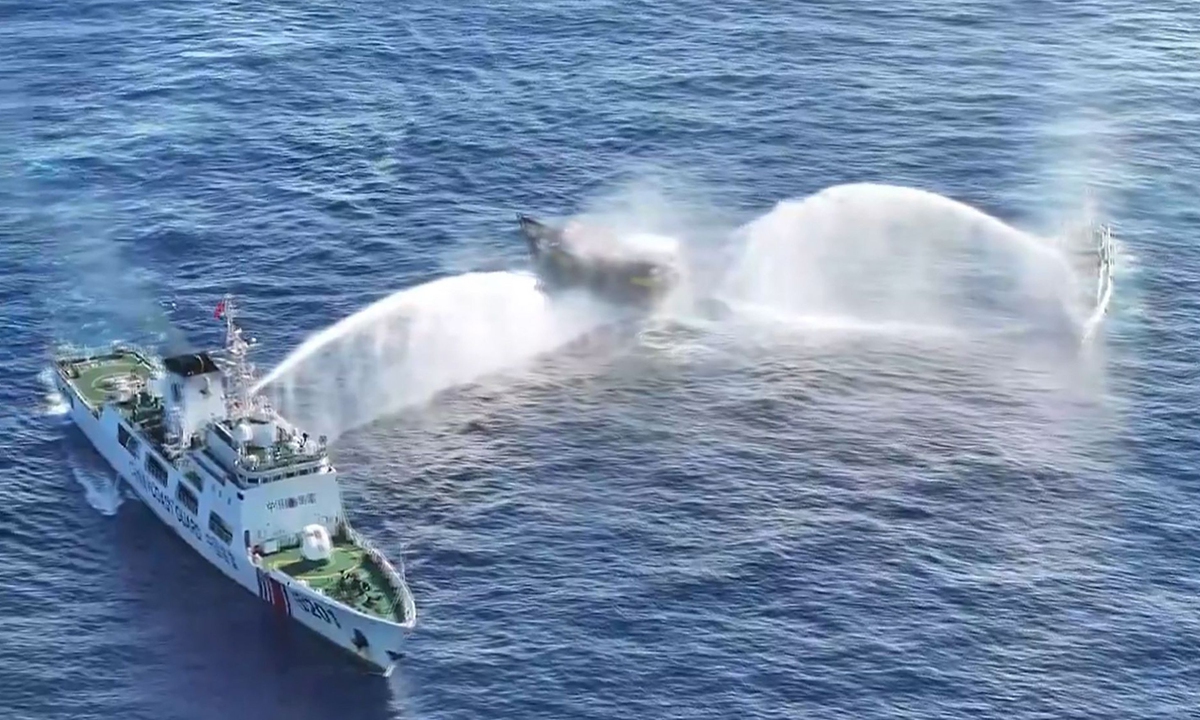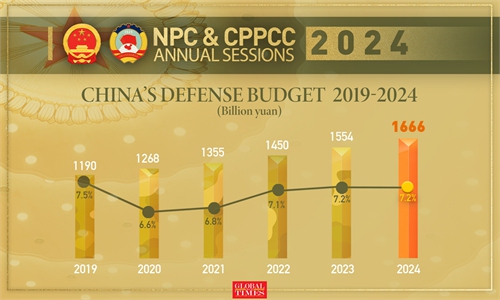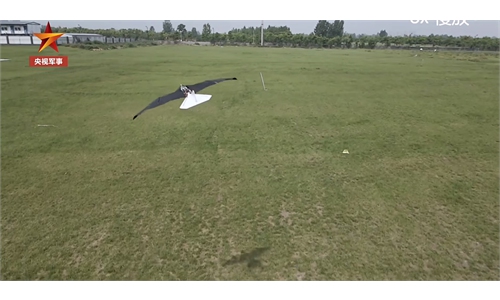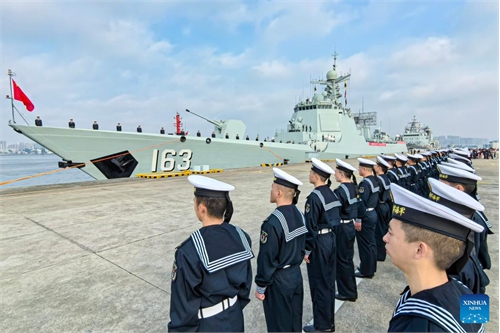Exclusive: CCG restricts Filipino ships' Ren'ai trespass in scrape-causing incident; water cannon deployed to warn Philippine vessel

Two Chinese law enforcement ships issue warning shots with water cannon at a Filipino vessel in waters off China's Ren'ai Jiao (Reef) in the South China Sea on March 5, 2024, as it makes dangerous approach to China Coast Guard Ship. Photo: VCG
The China Coast Guard (CCG) on Tuesday took restriction measures, including the use of water cannon, against Philippine vessels that had trespassed into waters off China's Ren'ai Jiao (also known as Ren'ai Reef) in the South China Sea, during which a Filipino vessel intentionally rammed into a Chinese ship and causing a minor scrape.
The Philippines' moves are unprofessional, irrational and immature that broke the status quo, escalating the tensions to an extremely dangerous level, experts warned, urging the Philippine side to return to the negotiating table as soon as possible.
Breaking its promise, the Philippines on Tuesday intentionally sent two coast guard ships and two cargo ships to trespass into waters off Ren'ai Jiao in China's Nansha Islands to send supplies to its illegally grounded warship, Gan Yu, a CCG spokesperson, said in a statement on Tuesday.
The CCG took restriction measures to control the situation strictly based on the law, and made temporary special arrangement to one Philippine ship that carried necessary living materials under humanitarian considerations, Gan said.
The CCG's on-site operation was reasonable, legitimate, professional and up to standard, the spokesperson said.
During the event, the Philippine Coast Guard Ship 4407 ignored repeated warnings from the Chinese side, violated the International Regulations for Preventing Collisions at Sea, and intentionally rammed into the CCG Ship 21555 in an unprofessional and dangerous manner when the latter was conducting normal law enforcement activities, Gan said.
This had led to a minor scrape, and the responsibility lies completely with the Philippine side, Gan said.
According to two video clips the Global Times obtained from a source close to the matter, in another incident during the same event, the Philippines' Unazaih May 4 made dangerous approaches to the CCG Ship 21551, forcing the Chinese law enforcement ship to issue warning shots with its water cannon at the Filipino vessel.
The Philippine vessel Unazaih May 4 makes dangerous approaches to China Coast Guard Ship 21551 in waters off China’s Ren’ai Jiao in the South China Sea on March 5, 2024. Video: Courtesy of a source close to the matter
China Coast Guard Ship 21551 issues warning shots with its water cannon at the Philippine vessel Unazaih May 4 in waters off China’s Ren’ai Jiao in the South China Sea on March 5, 2024. Video: Courtesy of a source close to the matter
The Philippine side failed to keep faith, intentionally stirred up troubles, sensationalized and hyped the incidents, and kept sabotaging peace and stability in the South China Sea, Gan said,
The CCG will always stand ready to resolutely counter any provocative and rights-infringing acts at any time, so as to firmly defend China's territorial integrity and maritime rights, Gan said.
Ding Duo, deputy director at the Research Center for Ocean Law and Policy at the National Institute for South China Sea Studies, told the Global Times on Tuesday that the Philippines' recent infringing activities in the South China Sea are planned and targeted, as it chose to make this latest provocation during China's two sessions to expand impact.
Making alternating provocations in Ren'ai Jiao and Huangyan Dao (also known as Huangyan Island), the Philippines has made the China-Philippines Bilateral Consultation Mechanism in the South China Sea a stalling tactic, and its South China Sea policy will be very unlikely to change anytime soon given the recent remarks by Philippine officials, Ding said.
While China will respond to the Philippines' every move on its own pace and principles, it still hopes that the Philippines can return to the negotiating table and jointly manage disputes through talks, rather than ways the international community does not want to see, Ding said.
As the Philippine Senate passed the Philippine Maritime Zones Act recently, Mao Ning, a spokesperson of China's Ministry of Foreign Affairs, said in a press conference on Tuesday that the Philippines attempted to further enforce the illegal arbitral award on the South China Sea by domestic legislation and include China's Huangyan Dao, most islands and reefs of China's Nansha Qundao (Islands), and their adjacent waters into its maritime zones, which severely violates China's territorial sovereignty and maritime rights and interests in the South China Sea.
China firmly opposes it and has lodged solemn démarches to the Philippines, Mao said.
Yang Xiao, deputy director of Institute of Maritime Strategy Studies at China Institutes of Contemporary International Relations, told the Global Times on Tuesday that the current tension on Ren 'ai Jiao and the surrounding waters in South China Sea is caused by the Philippines unilaterally changing the status quo and rushing to build permanent facilities to serve the illegitimate interests of some political forces .
In total disregard of basic historical facts and international consensus, the Philippines has spread a large amount of false information and taken a series of highly unprofessional and irrational decisions and actions, which is an extremely dangerous brinkmanship of conflict and war, Yang warned.
"Only by returning to the negotiating table can the stakeholders avoid a rapid escalation of the conflict and uncontrolled deterioration of the situation, and restore peace, stability, development, prosperity and sustainable security to the South China Sea region, all littoral states in the South China Sea and the people of the Philippines," Yang said.




